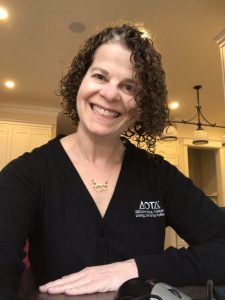
Sandra Schefkind, OTD, OTR/L, FAOTA is the Pediatric Practice Manager at the American Occupational Therapy Association (AOTA). She provides clinical assistance with practice-based inquiries from occupational therapy practitioners and others working with children and youth. For more than 25 years, Schefkind has provided occupational therapy services across the life course. She held a variety of clinical and administrative positions before joining AOTA, including Director of occupational therapy at Bryn Mawr Hospital and Director of early childhood programs at Imagination Stage, a Bethesda, Maryland, nonprofit arts organization that provides theater productions and classes to children with and without disabilities.
ED: How did you begin your career in early childhood?
SS: When I completed my bachelor degree in occupational therapy (OT) at Tufts University, I worked in adult rehabilitation in Philadelphia at Thomas Jefferson University and Bryn Mawr Hospital. I continued to work full-time while completing my Master’s degree in OT by attending evening classes at Temple University. I then moved to the Washington, D.C. area, where I was juggling raising a family with working. I transitioned to working in schools, homes, and private practices. Then I saw a sign in the window of a local children’s theater about a deaf access program. I was really interested in this program since I had also studied voice and theater.
I wanted to blend my arts and therapy background so I contacted them and began assisting in some of their classes for children ages five and up. They then asked me to develop classes during the day for young families to come to the theater. I became the Director of Early Childhood at Imagination Stage and developed a curriculum of play-based learning for families and young children ages one through five. I also provided professional development to the staff on developmental milestones and supported them on how to include children with differences. I developed additional programming for children with autism and their families. We took a video of the parents at the end of classes to get their feedback. I will never forget a mother telling me that she had never thought her family belonged in the theater because of her son’s differences, and how much the program had meant to them. That was a very powerful moment for me. When a position for the Pediatric Practice Manager was advertised at the American Occupational Therapy Association (AOTA), I applied. I have been working at AOTA for the past 13 years. Although I no longer work directly with families, I feel I am championing them every day.
ED: What efforts have you been involved in to improve the quality of early childhood programs and services?
SS: While at AOTA, one of my goals has been to bring early childhood activities, knowledge, and resources to our own organization. For example, I work to ensure that there are new articles and tools on the AOTA webpages such as on interprofessional practice and developing competencies to work with young children with disabilities and their families. I developed communities of practice for occupational therapy practitioners (OTPs) to learn from each other about evidence-based practices in early childhood and other topics like childhood trauma, transitions, and literacy. Additionally, I make sure that there are early childhood resources for OTPs from other organizations and technical assistance centers. In fact, I regularly promote resources from the ED-funded Early Childhood Technical Assistance Center!
In addition to using their resources, I work closely with key partners from national professional organizations and ED-funded technical assistance centers to make sure that OTPs are represented in their work. I have been working with the ED-funded Early Childhood Personnel Center to develop the interprofessional early childhood competencies and with the ED-funded National Center on Systemic Improvement on an infographic on early childhood teaming. I am continuously building my own knowledge as well. In 2016, I completed my clinical doctorate degree in OT from Thomas Jefferson University in Philadelphia, and I am now enrolled in a social learning certificate program which will help me continue to improve the quality of early childhood service and programs.
ED: What are some of the challenges have you experienced in your work and what strategies have you tried to overcome them?
SS: I have found that we often work in silos in early childhood. Because of this, there can be misunderstandings about the domain or scope of OT or underutilization of OTPs. Our partners may not be aware that the term “occupation” means activity. OTPs have knowledge and skills in both mental health and physical health to analyze activity, environment, and family strengths and abilities, and then adapt these for optimal participation to build family engagement in everyday routines and empower them. OTPs must be prepared to articulate and share their expertise and evidence that supports their interventions. They also need to articulate their value and contributions for the child outcomes measurement process as well as meeting children’s and families’ goals and objectives.
To break down silos, it is important that OTPs set regularly occurring meetings with partners. This can build stronger teams and interprofessional practice to learn from, with, and about each partner. It is also necessary for OTPs to be involved in data collection to look at the connection between services and child and family outcome data. Additionally, OTPs could share our resources to help others learn about the roles of OTPs and the evidence-based practices that OTPs use. They must offer inclusive, integrated services in homes, community settings, and preschools and employ coaching strategies to support children’s development and empower families within natural environments and routines.
ED: What suggestions do you have for others interested in improving early childhood services and programs?
SS: It is important to use the full array of available partners for program development, training, as well as service implementation. Since OTPs are front line providers in homes, hospitals, schools, and other community settings, they are prepared and well positioned to promote authentic participation in activities and support families and children throughout the day in all types of settings. In working with families, you can help them connect how their children’s mental and physical health can be developed through activity, and by identifying their children’s strengths and needs. This can include building healthy routines for sleep, reducing screen time, understanding the importance of tummy time and improving play. This will, in turn, promote early literacy and preschool readiness, establish habits to prevent conditions such as childhood obesity, and promote social-emotional and physical growth and development.
When thinking about policy to practice and research to practice, know that the national professional organizations have networks and state affiliates that can be of support to you in your work. They can disseminate key information, monitor trends, and share content for quality and practice improvement. AOTA also has a number of resources and looks forward to working closely with you!
Blog articles provide insights on the activities of schools, programs, grantees, and other education stakeholders to promote continuing discussion of educational innovation and reform. Articles do not endorse any educational product, service, curriculum or pedagogy.

